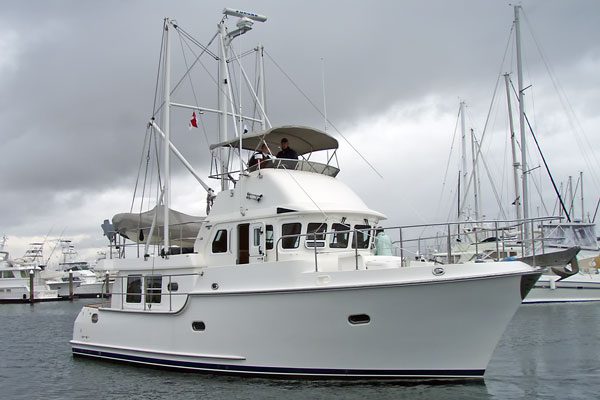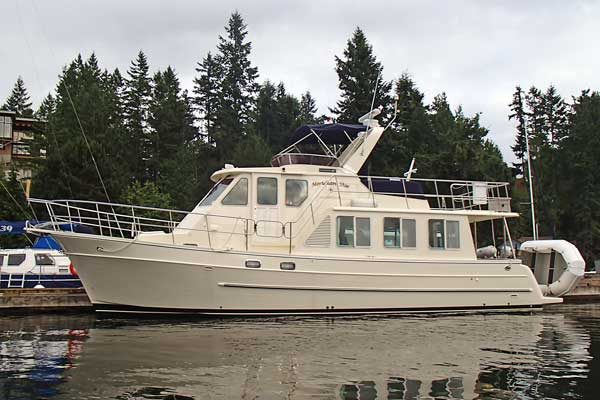The single most influential person in finding and purchasing your perfect trawler is your yacht broker. Interestingly enough, this decision is largely misunderstood by buyers. The same buyer who will spend hours researching trawlers to find the most suitable choice, will naively call or email several brokers to find out more information, unaware that by contacting each broker, they are becoming a lead that is entered into the companies’ data bases.
Many good yacht brokers will “qualify” an inquiry by asking if the client is working with other yacht brokers. This may seem like a simple, insignificant step, but it is essential in establishing the broker-client relationship. If you are interested in a particular boat model and have selected an agent to represent you in the purchase, then your broker should contact the other broker on your behalf. It is an all too common occurrence to find something intriguing while surfing the web and then send an email to the listing broker instead of enlisting your own broker to represent you. Remember, the broker with the listing was hired by the seller of the trawler and they are obliged to represent the seller. By contacting the listing agent directly without identifying that you are already working with a broker, you have created a direct relationship where the listing agent will “claim” you. This could make it more difficult to bring your designated broker into the picture after the fact.

You may be surprised to read this, but in reality, you don’t need a broker (you also don’t need a trawler), however, finding an experienced and trustworthy broker to represent you will provide a huge advantage. Some advantages are explained elsewhere on this website, but one important factor to remember is that the seller has agreed to the brokers’ commission upfront, not the buyer. The broker representing the buyer generally earns a larger commission than the seller’s, giving that salesperson extra motivation to get you the best result. Every broker whom you contact will want to be your exclusive representative, your ‘buyer’s broker’, to help you find your trawler. The question then becomes, how do you select a broker?
You should do your homework to find the best broker to select as your personal representative. Until you have “auditioned” and found that person, if you inquire about a trawler listing, tell the listing broker that you are NOT establishing a broker/client relationship and that you reserve the right to select your broker on your own terms, even though you are contacting them directly. This candid, honest approach, and the reaction you receive, will be telling as to the relationship you could have if that salesperson became your representative.
Many buyers take a shotgun approach and talk with several brokers. They have them all running in circles and jumping through hoops, which may seem like a great way to spread the load from a buyer perspective, but actually dilutes your effort to the point of ineffectiveness. While you are educating yourself on the trawler market, try to identify one broker who through experience, effort, word of mouth, referrals, and reputation rises to the top as the best choice for your representation. “Hire” that person to be your broker.
There are really two levels of yacht brokers – yacht salespersons and yacht brokers (“broker” is the common term whether the person is truly a broker or not). A salesperson is hired by a yacht broker to perform sales functions as an agent under the brokers’ business license. Brokers, typically business owners, pay the expenses to run their business and hire salespeople to extend their reach.
Most bonafide yacht brokerage firms have a separate, bonded “trust” account for the safe keeping of a boat buyers deposit funds during a transaction.
Each firm has different forms for conducting boat deals – listing agreements, purchase and sale agreements, counter offers, acceptance, and closing documents.
There are only two states that require sales licenses for used boat sales, California and Florida. In order to acquire a sales license in Florida, you submit the forms, submit fingerprints, pay a fee, post a bond, undergo a background check, and are required to have an employing broker. After two years practicing under an employing broker, you can upgrade your license from salesperson to broker. In California, are required to pass a written yacht salesperson exam while working for a licensed yacht broker. After two years in the business, you can apply to take the broker test if you wish to become a California yacht broker.

Yacht brokerage firms have local and state business regulations they must comply with. There are also regional associations that yacht brokerage firms can join which mandate a code of ethics and best business practices. In the US and Canada all of the regional associations are interconnected through the YBAA (Yacht Brokers Association of America), based in Maryland. The North American member associations are British Columbia Yacht Brokers Association, Northwest Yacht Brokers Association, California Yacht Brokers Association, Gulf Coast Yacht Brokers Association, Florida Yacht Brokers Association, and the Ontario Yacht Brokers Association.
YBAA also offers a testing program for yacht salespersons with a minimum of two years of experience that can lead to the ultimate credential in the business, the CPYB (Certified Professional Yacht Broker). This “professional” distinction is difficult to earn and requires studying for and passing a two-hour exam. Upon successful completion, the CPYB is accredited for three years and must be renewed through a point system of continuing education. This is similar to how only accountants and real estate agents who take their game to the highest level of certification become CPAs and Realtors.
Developing trust and confidence while learning what their clients’ needs and goals excites many of the top salespeople in the industry – as much as closing the deal and seeing their client (now friend) enjoying the right trawler purchased for the right price. Since the broker does not make any money until the deal closes, some aggressive brokers looking for immediate gratification have put their clients into trawlers that are not suited for the type of cruising they have planned. However, most professional brokers look at the big picture and avoid short cuts. They focus on their client’s needs and wants and the long-term results of their actions. This leads to all around satisfaction with happier clients, which in turn may lead to future listings and word of mouth referrals. The REPUTATION of brokers is not created overnight. Do your research, ask around and when you are ready to make a connection and commit, reach out and pick who YOU want to work with – YOU CAN AND SHOULD SELECT WHICH BROKER YOU WANT TO REPRESENT YOU.
